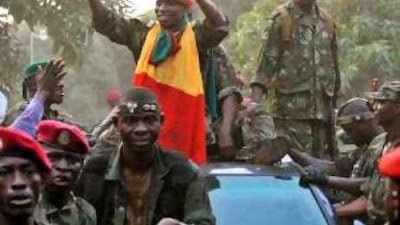NAIROBI // In the film Weekend at Bernie's, the campy 1980s movie, two guys spend a weekend with their boss, Bernie, at his posh beach house. When their boss unexpectedly dies, the protagonists prop up his corpse, parade him around town as if he were still alive and continue living it up in Bernie's luxury villa. As you might expect, hilarity ensues. This script sounds all too similar to the drama that has played out in Guinea, the small, impoverished west African nation. Lansana Conté, the strongman president of Guinea, officially died on Monday, but for all we know, he may have been dead for the past five years. The dictator was rarely seen in public and when he was, he looked sick and frail.
It was long rumoured that Conté's close circle of senior advisers were keeping him in power while they looted the country's mineral wealth. Although in Guinea's case, no one was laughing. The charade finally ended this week when the president of the country's National Assembly announced that Conté, who was believed to be 74, had died. Conté, who had never groomed a successor, had been in poor health for years. It was probably diabetes that finally killed him.
Hours after the president's death, military leaders announced they had dissolved the constitution and the government as they seized power in a coup. This scene is not unlike the way Conté came to power 24 years ago. In 1984, when Ahmed Sékou Touré, Guinea's first post-independence president, died in a hospital in Cleveland, Ohio, Conté, then an army officer, led a military takeover of the government. Conté soon became a darling of the West as he scaled back many of Touré's socialist policies. During the late 1990s, Guinea remained a bastion of stability in west Africa, where four of Guinea's neighbours - Guinea Bissau, Sierra Leone, Liberia and Ivory Coast - were embroiled in civil wars.
Western nations, including the United States, flooded the country with foreign aid and military support. US Army Rangers could be seen tramping around the jungle along the Sierra Leone and Liberia frontiers training Guinean border guards to protect their country from a spillover of those conflicts. The West had a reason to keep Guinea stable. The country has half of the world's reserves of bauxite, the ore used to make aluminium, as well as gold and diamonds. Western mining companies have enjoyed the access to Guinea's minerals while government officials have grown fat off mining contract kickbacks.
Despite its mineral wealth, Guinea remains one of the poorest countries in the world. The people, who live in Guinea's steamy costal swamps, rugged mountainous interior and flat, dusty hinterlands, have learned to survive with little help from their government. Most live on far less than US$1 (Dh3.67) per day and exist by raising cattle and cultivating rice, corn, potatoes and cassava. For most of the people who live outside of Conakry, the crumbling seaside capital, the change of power will not impact their lives. Conté brought little development or infrastructure to the country of nine million. A new government - be it military junta or democratically elected - will not likely turn the country around anytime soon.
Still, most people will probably welcome a change from Conté, who held the country in a perpetual state of paralysis for years. Conté is one of the last of the dying breed of African "Big Men" - leaders in the vein of Zimbabwe's Robert Mugabe who cling to power as their countries crumble. Conté banned opposition parties and frequently jailed political opponents. In 2001 he changed the constitution to abolish presidential term limits, affectively making him president for life. But the population became fed up with the bad governance in recent years. General strikes shut down the country and angry mobs staged violent protests over rising food and fuel prices. Each time Conté sent in the army to quell the uprisings.
Guinea's three main ethnic groups live together in relative peace, but this uncertain presidential transition could see one of the tribes trying to grab power. Touré, from the Malinke tribe, led Guinea to independence from France in 1958. During Conté's reign, his Susu tribe benefited the most from development projects. Meanwhile the Fulani, a tribe of merchants and cattle herders, have been left out of power. The Fulani think that the next president should come from their tribe.
For now, at least, it seems the next president will come from the military. Moussa Camara, an army captain and leader of the junta, has declared himself president, ignoring the constitution that says the speaker of the National Assembly should be in charge. As tanks and lorries full of soldiers rolled through the streets of Conakry this week, thousands of Guineans came out to watch what must seem like a bad sequel to an even worse movie.
Matt Brown is The National correspondent in east Africa. He lived and worked in Guinea for two years. mbrown@thenational.ae

